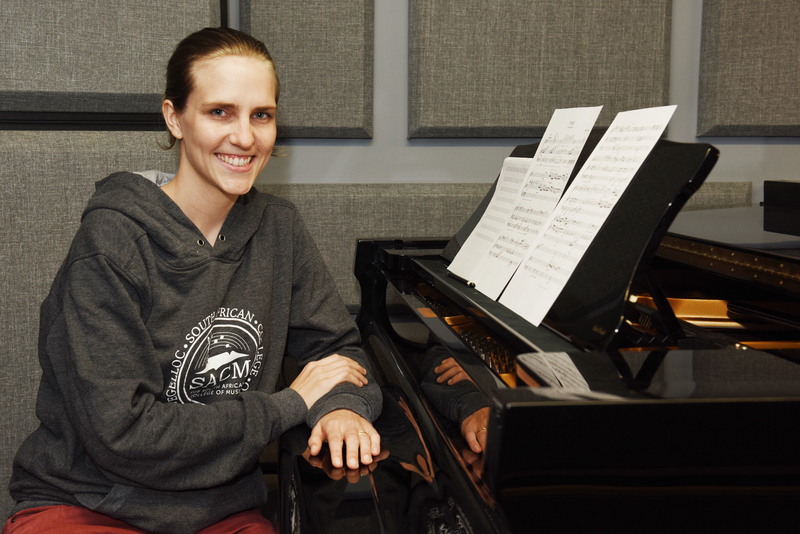Student's piano composition for international festival
23 June 2017 | Story Helen Swingler. Photo Robyn Walker.
South African College of Music student Maike Watson’s composition for piano Prälüd has been chosen for the International Society for Contemporary Music (ISCM) 2017 festival in Vancouver in November. She is one of 88 composers from 50 countries whose works have been selected.
The ISCM featured Russian-born composer, pianist and conductor Fyodorovich Stravinsky when he was alive and is the leading institute and premier network for new, contemporary classical music. Each year the festival is hosted in a different city.
Prälüd, a solo piano piece, is written in the octatonic scale, an eight-note modular scale, based on a repeated pattern of alternating half and whole steps.
Watson explained: “For the listener not used to hearing the octatonic scale, it might sound a little strange because many western melodies we grew up with used major or minor modes that only have seven pitch classes in the scale.”
There is a long tradition of composers using the octatonic scale. Examples are Béla Bartók’s Harvest Song (Ara táskor) Violin Duo # 33, Frederic Chopin’s Ballade No. 1 in G minor, Op. 23 (bars 130–2); and Joseph Haydn’s String Quartet in F minor, Op. 20, No. 5[6].
“But a lot of modern music also uses the octatonic scale, so it’s not that creative or revolutionary,” said Watson.
For interest, contemporary examples found on one site lists Radiohead’s “Just” and even local band Die Antwoord’s (hold your breath) “Fok julle naaiers”, where the piano line in the introduction is in the octatonic scale.
Early composer
Having her piece chosen for a festival as prestigious as the ISCM is a milestone. Watson has always loved composing. As a five-year-old she’d create her own pieces on the piano at home.
“I never thought much of it; children often make up their own melodies.”
Later, in music class, they’d ask her to play something she’d written. But on leaving school she was torn between studying music and maths, the rival for her affections.
Her parents knew the vicissitudes of a career in music (her father is a musician) and encouraged her to become an engineer, “to get a real job”. Watson resolved this dilemma by enrolling for a BSc with a split major: maths and music.
After graduating in 2013 she took a job as a data analyst, planning to fund a business writing film scores, with an eye on emulating legends like John Williams, who wrote the scores for Star Wars, Jurassic Park and the Harry Potter films.
But after six months, she gave it up.
“I had to do this music thing. I need music to live.”
After a few years of freelancing, Watson returned to UCT to study music composition part-time. During this time she joined New Music SA, a non-profit organisation promoting contemporary music that she discovered during a contemporary electronic music festival.
Waking up to good news
Prälüd grew out of an assignment last year, but Watson continued working on the piece until she was happy with it. When the ISCM call for piano scores came up (“They really wanted something from South Africa”), she had just the piece.
It was a long wait before she heard from the ISCM. Used to the usual flow of rejections (“I have hundreds of email rejections”), Watson had all but given up on her piece being selected. But six months later the good news landed early one morning. She ran to wake her husband, Gareth.
“He’s not a morning person, but he was really supportive.”
The two met in maths class – another reason she’s glad she took the split major.
Her own listening choices are varied; she loves the old composers, particularly the romantic period (1815 to 1910) and orchestral music.
“But I also like modern electronic music, like Zedd [apologetic grimace]; it depends on my mood. There’s an art to working with computers to make music. Fusing orchestral and electronic music works really well. You can enhance the experience of a symphony with new sounds you can make with a computer that you can’t make with a violin or a trumpet.”
Some might even call it engineering.
Will she attend the festival?
“I’d love to, but Vancouver is a long way − and expensive. And I recently returned from a tour with the Cape Town Youth Choir to New York and Boston.”
 This work is licensed under a Creative Commons Attribution-NoDerivatives 4.0 International License.
This work is licensed under a Creative Commons Attribution-NoDerivatives 4.0 International License.
Please view the republishing articles page for more information.










